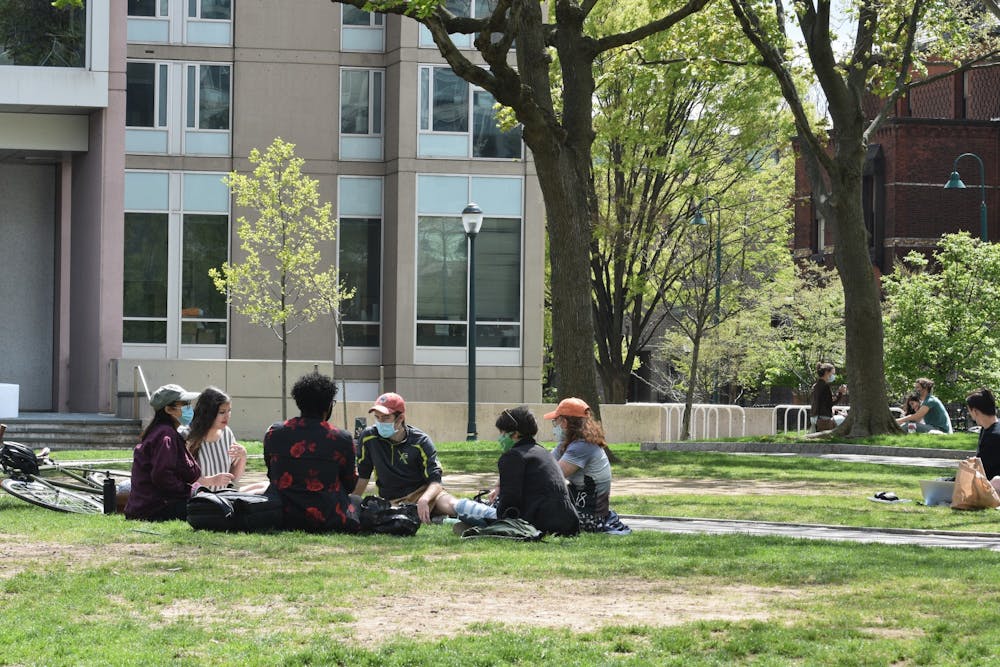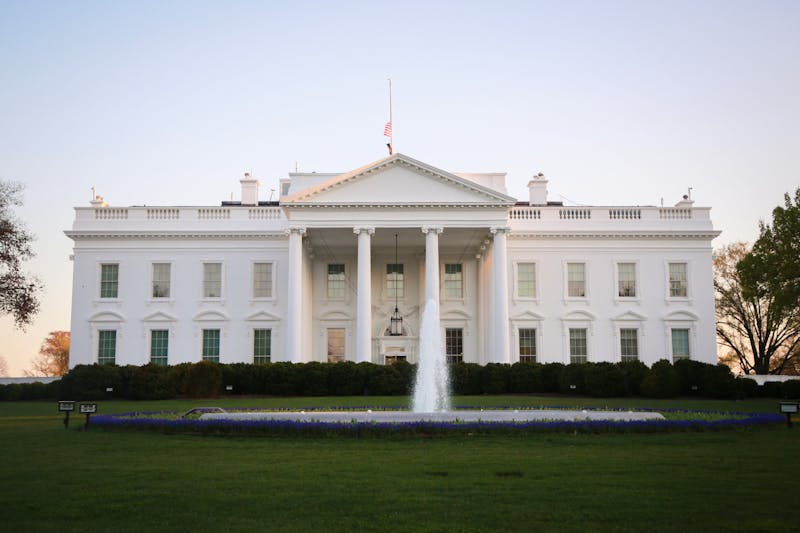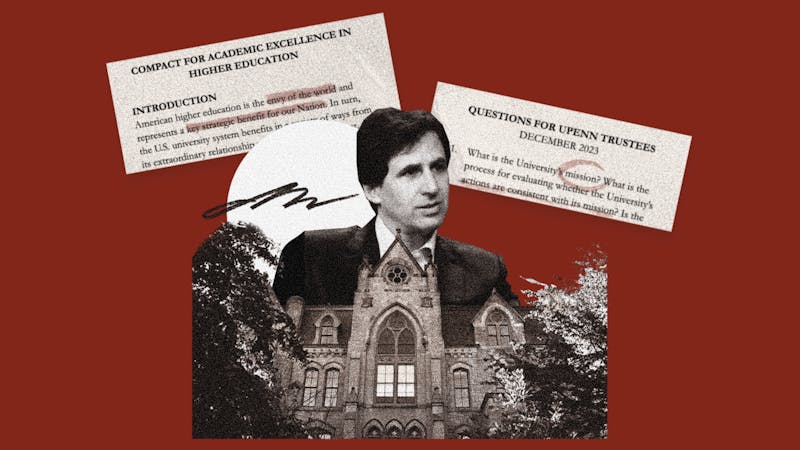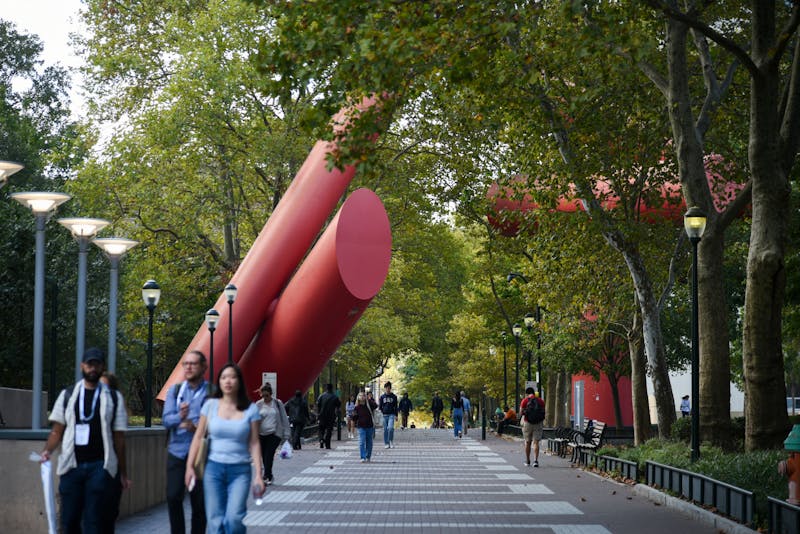
Over the past year, we’ve developed an interesting culture surrounding physical contact. We’ve replaced the majority of in-person gatherings with virtual ones, and on the rare occasions that we elect to see each other face-to-face, we’re permeated with the fear of contagion. We’ve replaced handshakes with waves from a distance, and we’ve replaced hugs with elbow taps.
That should change very soon.
All adult Americans are now eligible to receive a vaccine against COVID-19, and I, along with many other Penn students and Philadelphians, received my first dose last week. It felt wonderful to join the 130-million-plus Americans who have received a first dose, and I’m eager to join the 85 million who are fully vaccinated. But amid the joy I felt from my newfound partial immunity, I also felt confusion.
We’ve all made heavy sacrifices over the past year, avoiding contact with others and forcing ourselves online to socialize. Our Zoom reunions were awkward at times, pleasant at others, but always a poor replacement for the magic of being in the same room as our loved ones. I’ve been eagerly awaiting my vaccination because I’ve been eagerly awaiting safe socialization indoors and in restaurants and bars. But when will I actually be able to resume such contact?
“The subtlety is [that] there's a continuum of immunity,” says Robert Gross, Professor of Medicine and Epidemiology at the Perelman School of Medicine. What complicates post-vaccination life is that there are currently three approved vaccines against COVID-19 in the United States (though use of the Johnson & Johnson vaccine is currently paused), and at different points of administration, they confer different levels of protection.
The Centers for Disease Control and Prevention guidelines state that fully vaccinated individuals (people who received their final vaccine dose at least two weeks prior) can congregate indoors with other fully vaccinated individuals without wearing masks or physically distancing. Furthermore, fully vaccinated individuals can congregate indoors with one pod of unvaccinated individuals (given that those individuals are not at a higher risk of contracting COVID-19). “[If] you know the other person was truly vaccinated and it was two weeks ago ... I think most activities that people would want to engage in with close friends and sex partners would be very low risk,” says Gross.
“There's a caveat though,” Gross is quick to mention. “I would urge people to not do this [congregate indoors] in public.” Even though fully vaccinated people are at minimal risk if they go maskless in public, it sends the wrong message to others who may not have yet received a vaccination. Until more people get their shots and public health officials say otherwise, we have an obligation to behave responsibly while outside or in public — this includes wearing masks and keeping physical distance.
For those who have received their first dose and are wondering if they can resume meeting people in person, there is still a risk, though it is reduced. “The truth is that a couple weeks after a single dose, there is substantial protection,” says Gross. Being half vaccinated confers some immunity, but it is still necessary to use good judgement in any potential encounters with other people. Wearing masks is still crucial, and it’s important to remember that as we near the end of the semester, students may be heading home to family members who may be at higher risk of contracting COVID-19. Yet evidence suggests that one dose of the vaccine is sufficient to confer full immunity among those who have already contracted COVID-19. And among those who haven’t, one vaccine dose stems the risk of illness by more than 50%. But what if you’re the only unvaccinated or half-vaccinated person in a group of fully vaccinated people? “When you have a partial immune person in a setting of a lot of fully immune people, risks are very, very low,” says Gross.
However, it’s important to understand that some people might still be uncomfortable with resuming things like handshakes and hugs, and that’s okay. People may be or come into regular contact with immunosuppressed or vaccine-hesitant people and would rather keep distance, even if they’re fully vaccinated. Gross, who is an expert on HIV/AIDS and sexual medicine, says that some of the norms surrounding sexual consent can apply to how we navigate casual physical contact in a post-COVID-19 world. “Before I hug my friends, I say, ‘Hey, I know you're vaccinated. Are we hugging?’ It's sort of like, ‘are we using condoms?’ It's a similar negotiation,” he says.
“Are we hugging?” is a simple phrase that allows other people a space to voice concerns if they or someone they love is still at risk. “Give people an out,” says Gross. “Don't make assumptions about what their risk tolerance is. If you do that, you won't be stigmatizing people, and they won't be put into uncomfortable positions.”
Things are looking up and the end is in sight. Know your risk, assess the situation, and after asking, go in for a hug. You’ve earned it.
VARUN SARASWATHULA is a College junior studying neuroscience from Herndon, Va. His email is saraswathula@thedp.com.
The Daily Pennsylvanian is an independent, student-run newspaper. Please consider making a donation to support the coverage that shapes the University. Your generosity ensures a future of strong journalism at Penn.
Donate






